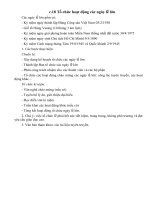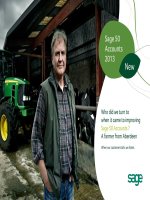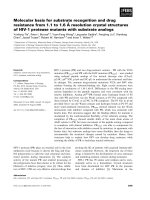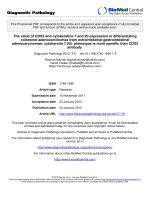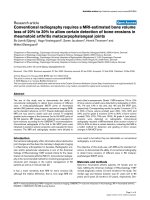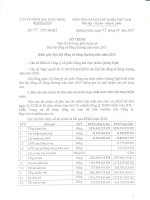20 to 50 million vndyear, motorbikes from 500,000 vnd to 1 million vnd
Bạn đang xem bản rút gọn của tài liệu. Xem và tải ngay bản đầy đủ của tài liệu tại đây (35.8 KB, 3 trang )
At the Government Forum in November 2011, the Ministry of Transport of
Vietnam proposed to collect the circulation fee for personal transport vehicles from 20 to
50 million VND/year, motorbikes from 500,000 VND to 1 million VND / year. The toll
collection is piloted in 5 cities: Hanoi, Ho Chi Minh City, Da Nang, Can Tho and Hai
Phong.
<Data source: the Ministry of Transport of Vietnam>
Figure 1: Amount of vehicles in 5 major cities in 2020
The number of motorbikes in circulation in Hanoi, Ho Chi Minh City, Da Nang,
Hai Phong and Can Tho can reach tens of millions of units. Collecting such a large amount
of money makes motorbikes subject to many fees. Not to mention the registration fee,
number plate, and registration fee (both cars and motorbikes) have increased very high
compared to the past. Since January 1, 2012, cars and motorbikes continued to be subject
to environmental protection tax, which is included in the price of gasoline and possibly
road maintenance fees that have been submitted to the Government by the Ministry of
Transport for approval.
The increase in toll rates for personal transport has a negative impact on the welfare
of all households and people, as prices increase accordingly. At that time, people with high
incomes are affected slightly more than the poor. However, the poor will suffer more than
the rich because of their less income.
Another fact is that a very large number of people living in the city center have a
car but work in areas outside the city. If the toll is too high, it will raise the cost of goods. It
is not yet guaranteed to store goods in the inner city area, which currently depends heavily
on the small truck force. Therefore, the transportation fees are not practical and effective
from an economic perspective. This proposal should not be approved. If collecting fees is
the only solution, the Ministry of Transportation needs another solution, which is to take
into account other sources, such as property taxes for the rich, to disperse revenue sources
and avoid fees-concentrating on the regular people and the disadvantaged.
The proposal of the Ministry of Transport needs to be reconsidered because it is not
possible to use the goal of reducing traffic congestion to place more burdens on people's
shoulders. This is a big problem, so the Ministry of Transport needs to get public opinion
before proposing it.
In the long term, improving the efficiency of budget expenditure will play an
essential role in reducing the budget deficit. Increasing the collection of vehicle fees does
not ensure a budget revenue raise if the increase in taxes reduces production rate and
consumption.
In my opinion, fees and charges should not be the tools to regulate traffic. Vietnam
remains a developing country, and such an increase in vehicle fees is a hit on people's
income, limiting transactions and commerce in the social lives, agencies and organizations
in provinces and cities, leading to an impediment to social development.
According to traffic experts, traffic congestion in the capital originates from many
causes:
population growth, leading to a rapid increase in personal transport in the inner city
narrow, crisscrossed road surface area
Low awareness of obeying the Traffic Law
From my point of view, to solve the immediate traffic jams, there is one easiest
method: to move universities, colleges, and vocational schools out of the inner city to the
suburbs area, then traffic-related activities will be limited without affecting the
development of the whole society.


